"Patients suffering from hemiparesis - the weakness or paralysis of one of two paired limbs - undergo physical therapy, but this therapy is challenging, exhausting, and usually has a fairly limited effect," said lead investigator Prof. Roy Mukamel of TAU's School of Psychological Sciences and Sagol School of Neuroscience, who conducted the research with his student Ori Ossmy. "Our results suggest that training with a healthy hand through a virtual reality intervention provides a promising way to repair mobility and motor skills in an impaired limb." The research was published in Cell Reports.
Does the left hand know what the right hand is doing?
53 healthy participants completed baseline tests to assess the motor skills of their hands, then strapped on virtual reality headsets that showed simulated versions of their hands. The virtual reality technology, however, presented the participants with a "mirror image" of their hands -- when they moved their real right hand, their virtual left hand would move.
In the first experiment, participants completed a series of finger movements with their right hands, while the screen showed their "virtual" left hands moving instead. In the next, participants placed motorized gloves on their left hands, which moved their fingers to match the motions of their right hands. Again, the headsets presented the virtual left hands moving instead of their right hands.
The research team found that when subjects practiced finger movements with their right hands while watching their left hands on 3D virtual reality headsets, they could use their left hands more efficiently after the exercise. But the most notable improvements occurred when the virtual reality screen showed the left hand moving while in reality the motorized glove moved the hand.
Tricking the brain
"We effectively tricked the brain," said Prof. Mukamel.
"Technologically, these experiments were a big challenge," Prof. Mukamel continued. "We manipulated what people saw and combined it with the passive, mechanical movement of the hand to show that our left hand can learn even when it is not moving under voluntary control."
The researchers are optimistic that this research could be applied to patients in physical therapy programs who have lost the strength or control of one hand. "We need to show a way to obtain high-performance gains relative to other, more traditional types of therapies," said Prof. Mukamel. "If we can train one hand without voluntarily moving it and still show significant improvements in the motor skills of that hand, we've achieved the ideal."
The researchers are currently examining the applicability of their novel VR training scheme to stroke patients.
Tel Aviv University (TAU) is inherently linked to the cultural, scientific and entrepreneurial mecca it represents. It is one of the world's most dynamic research centers and Israel's most distinguished learning environment. Its unique-in-Israel multidisciplinary environment is highly coveted by young researchers and scholars returning to Israel from post-docs and junior faculty positions in the US.
American Friends of Tel Aviv University (AFTAU) enthusiastically and industriously pursues the advancement of TAU in the US, raising money, awareness and influence through international alliances that are vital to the future of this already impressive institution.
Ossmy O, Mukamel R.
Neural Network Underlying Intermanual Skill Transfer in Humans.
Cell Rep. 2016 Dec 13;17(11):2891-2900. doi: 10.1016/j.celrep.2016.11.009.
